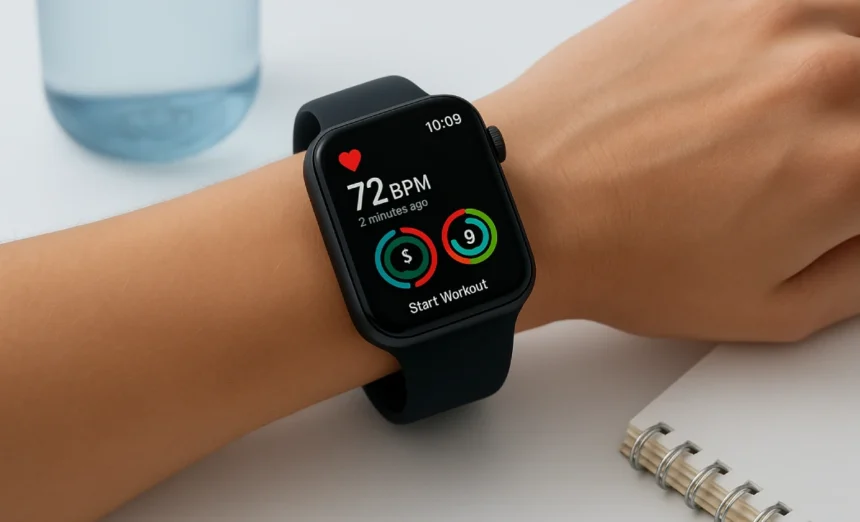Wearable health technology has transformed how we approach our wellness journeys. These fitness trackers and smartwatch health tracking devices offer personalized insights that help millions of people make better daily choices. Understanding why personalized wellness through digital health apps and continuous health monitoring has become so appealing can help you decide if this approach fits your lifestyle.
The Appeal of Personalized Wellness
Personalized wellness means creating health optimization tools and plans that fit your unique body, habits, and goals. Unlike one-size-fits-all approaches, biometric tracking devices collect your specific wellness data insights to guide decisions. This individualized method resonates with people who want control over their health journey through real-time health monitoring.
Activity tracking devices empower users by providing real-time insights into their daily patterns and lifestyle optimization opportunities. You can see how your sleep affects your energy, or how stress impacts your heart rate, through continuous health monitoring. This immediate feedback from health and fitness technology creates a stronger connection between actions and outcomes, making healthy choices feel more meaningful and achievable.
The psychological appeal runs deeper than just data collection and analysis through self-quantification. Having concrete numbers and trends from biofeedback devices gives people a sense of control over their wellness journey. Goals become more tangible when you can track progress through specific metrics rather than relying on subjective feelings alone.
Many users find motivation through the gamification elements that fitness trackers provide. Closing activity rings, reaching step goals through step counter technology, or improving sleep scores creates positive reinforcement. This approach transforms healthy habits from chores into engaging challenges that people want to complete.
Key Wellness Metrics Tracked by Biometric Tracking Devices:
• Heart rate and heart rate variability tracking
• Sleep tracking wearables for quality and sleep stages
• Daily activity levels and steps via step counter technology
• Stress indicators through biofeedback devices
• Recovery metrics for lifestyle optimization
• Calorie and nutrition tracking estimates
How Wearables and AI Wellness Tools Work Together
AI health coaching transforms raw wearable data into actionable wellness data insights you can use. While your biometric tracking devices collect thousands of data points daily, AI health algorithms analyze patterns to suggest personalized fitness plans. This combination makes complex health information simple and practical for everyday decisions through health optimization tools.
Digital health apps examine your sleep patterns, activity levels, and stress markers together through continuous health monitoring. Based on these combined insights from real-time health monitoring, they might suggest optimal workout times, recommend stress management techniques, or advise when to prioritize recovery. This holistic approach considers how all aspects of your health connect and influence each other.
The process works through continuous learning and adaptation to your specific responses within connected health ecosystems. As you follow recommendations and input feedback, AI health algorithms become better at predicting what works for your body. This creates increasingly personalized fitness plans that evolve with your changing needs and goals over time.
Popular AI health coaching features include personalized fitness plans that adapt to your recovery status. Some mobile health (mHealth) apps analyze your sleep data to recommend the best times for challenging workouts versus gentle activities. Calorie and nutrition tracking guidance might adjust based on your activity levels and stress patterns, creating truly individualized wellness approaches.
Step-by-Step Guide to Leverage AI Health Coaching:
- Set up your biometric tracking devices with accurate personal information
- Wear consistently for at least two weeks to establish baselines
- Review weekly wellness data insights and follow one recommendation at a time
- Provide feedback to help AI health algorithms learn your preferences
- Gradually incorporate more suggestions as habits form
Practical Benefits of Using Wearables for Wellness
The tangible benefits of health and fitness technology extend far beyond simple step counting. Early detection capabilities through preventive healthcare tech allow users to notice unusual patterns before they become serious problems. Heart rate irregularities, sleep disruptions, or stress spikes can alert you to potential issues worth discussing with healthcare providers.
Studies show that using activity tracking devices increases personal activity by an average of 1,300 steps per day, according to UCLA Health research. This improvement demonstrates how continuous health monitoring translates into real behavioral changes. The constant gentle reminders and progress tracking help maintain consistency in healthy habits.
Sleep tracking wearables represent another significant practical benefit that users experience regularly. These biometric tracking devices track sleep stages, helping users understand what factors contribute to restful nights. Many people discover that small changes in evening routines or bedroom conditions dramatically improve their sleep scores and daily energy levels.
Mental wellness tracking becomes more effective when you can identify patterns and triggers through real-time health monitoring. Biofeedback devices detect physiological stress markers, allowing users to practice breathing exercises or mindfulness techniques at optimal moments. This proactive approach prevents stress from building up throughout the day and improves overall mental wellness tracking.
Popular Digital Health Apps That Integrate with Activity Tracking Devices:
• Samsung Galaxy Watch ecosystem for comprehensive tracking
• Levels for Continuous Glucose Monitoring (CGM) and metabolic insights
• Sleep tracking wearables apps that sync with device sleep data
• Mental wellness tracking platforms with guided breathing exercises
• Calorie and nutrition tracking apps that consider activity levels
Busting Myths About Wearables and Personalized Wellness
Several misconceptions prevent people from exploring the benefits of health and fitness technology. The most common myth suggests that fitness trackers are only useful for serious fitness enthusiasts or athletes. In reality, these health optimization tools benefit anyone interested in understanding their daily habits and making gradual improvements to their health and wellness routines.
Privacy concerns create another barrier, with some people worrying about data security and sharing within connected health ecosystems. Reputable brands like Apple Watch, Fitbit, and Samsung Galaxy Watch use encryption and allow users to control data sharing preferences. Most wellness data insights stay on your personal devices unless you specifically choose to share them with healthcare providers or mobile health (mHealth) apps.
Data accuracy doubts lead some people to dismiss wearable health technology entirely without understanding its true purpose. While biometric tracking devices aren’t wearable medical devices, they excel at tracking trends and relative changes over time. The value lies in understanding your patterns through real-time health monitoring rather than achieving perfect precision in every measurement.
Many people believe that using activity tracking devices will make them obsessed with data and numbers through self-quantification. However, most users find that initial data fascination settles into healthy awareness after several weeks. The key is using wellness data insights as helpful guides rather than strict rules that control every decision you make.
Quick Myth-Busting Checklist: ✓ Fitness trackers benefit all fitness levels, not just athletes ✓ Privacy controls in connected health ecosystems allow you to manage data sharing ✓ Trend tracking through continuous health monitoring is more valuable than perfect accuracy ✓ Healthy awareness differs from obsessive self-quantification
Getting Started with Personalized Wellness and Wearables
Choosing the right health and fitness technology depends on your specific wellness goals and lifestyle preferences. Fitness-focused users might prioritize advanced features in devices like Garmin or WHOOP, while others may value sleep tracking wearables and mental wellness tracking from brands like Oura Ring or Apple Watch. Consider which health aspects matter most to you before comparing device capabilities and features.
Setting up your biometric tracking devices properly ensures accurate baseline measurements for personalized fitness plans. Input correct personal information, including age, height, weight, and activity level for optimal AI health coaching. Wear the device consistently, especially during sleep, to establish reliable patterns that health optimization tools can analyze effectively.
Integration into daily routines works best when you start with small, manageable changes through lifestyle optimization. Choose one or two wellness data insights to focus on initially rather than trying to optimize everything simultaneously. This gradual approach prevents overwhelming yourself while building sustainable habits through continuous health monitoring that lasts long-term.
Free resources and beginner-friendly digital health apps make starting easier than many people expect. Most activity tracking device manufacturers like Fitbit, Amazfit, and Huawei Watch Fit provide comprehensive apps with AI health coaching features, educational content, and community support. These built-in resources often provide enough guidance for beginners without requiring additional paid subscriptions or services.
Beginner Success Tips:
• Start with basic metrics before exploring advanced features in health optimization tools
• Set realistic goals based on your current activity levels
• Use built-in AI health coaching features before seeking external mobile health (mHealth) apps
• Connect with friends or family members for motivation and accountability
• Review weekly wellness data insights rather than obsessing over daily fluctuations
Conlusion
Personalized wellness using wearable health technology has gained popularity because it transforms abstract health concepts into concrete, actionable wellness data insights. The combination of real-time health monitoring, AI health coaching, and psychological motivation creates a powerful framework for sustainable healthy habits. These health optimization tools democratize access to personalized health guidance that was once available only through expensive professional services.
The practical benefits extend beyond fitness tracking to include sleep tracking, wearables optimization, mental wellness tracking, and early health pattern recognition through preventive healthcare tech. While myths about complexity, privacy, and data obsession persist, the reality is that modern biometric tracking devices are designed for everyday users who want simple ways to improve their wellness without dramatic lifestyle overhauls.
Getting started requires choosing the right health and fitness technology for your goals and integrating wellness data insights gradually into your routine. The key to success lies in viewing activity tracking devices as helpful guides rather than strict controllers of your decisions, allowing you to maintain a healthy relationship with technology while pursuing better health through continuous health monitoring.
Taking a comprehensive approach to wellness means considering all aspects of your health, from physical activity and sleep to nutrition and stress management. Wearable devices provide the data foundation, but lasting wellness improvements come from addressing multiple health factors simultaneously.



